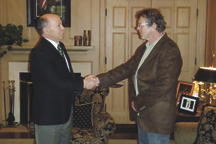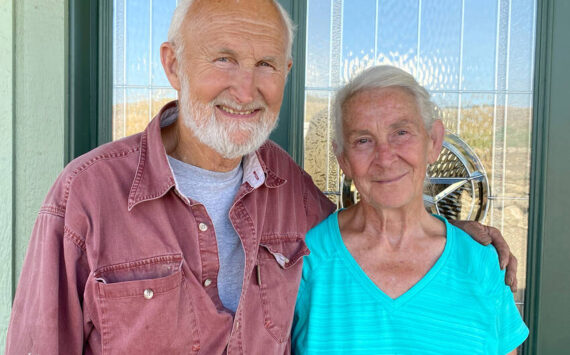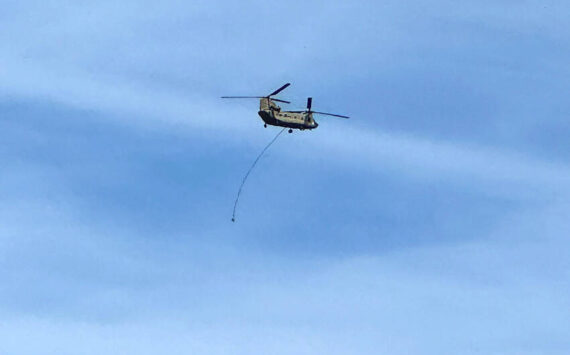
Tonasket veteran Michael Stewart meets with “First Mike” Gregoire, husband of Governor Chris Gregoire and a proponent of veterans’ affairs, at the Governor’s mansion last month.
TONASKET – It’s not often one’s work gets recognized at the highest levels.
But local veterans Michael Stewart and Dale White found out that sometimes that work does get noticed.
Stewart and White recently were invited to the Governor’s mansion, where a half hour tour with the “First Mike” – Governor Christine Gregoire’s husband Mike Gregoire, a veteran himself who is an advocate for vets’ issues – turned into a two and a half hour meeting of like minds.
“Dale has been thanked a lot of times in his life for the work that he’s done over the years,” Stewart said. “He helped me get this pat on the back. First Mike (official title, First Gentleman, though he prefers the nickname) has missed very, very few funerals of veterans who have died. He was a lieutenant in Viet Nam artillery himself, so he understands.
“We got a great tour of the mansion. It was supposed to be coffee and cookies, but we got talking about Viet Nam and our work. He was excited and interested in all of our discussions.”
North Valley Hospital’s Veterans Services Officer, Shane Barton, said that Stewart and White were the driving forces in getting the VA clinic set up there last year.
“Dale and Mike were instrumental in getting the clinic and tons of other services set up here,” he said. “My position, mental health, extended care services wouldn’t have happened without them.”
Stewart has been in the area for more than 30 years, while White moved here about eight years ago after working in the national services office in Seattle. The two had been friends since the 1980s and pooled their talents and no-apologies approach to procuring services for veterans.
“Dale has been in the business for 32 years,” Stewart said. “With his professional knowledge of the business of how the veterans service works from running the national office in Seattle, he had a lot of contacts that gave us the information we needed to convince our county commissioners that we knew what we were talking about.”
Stewart said the NVH VA clinic — a Community Outreach Based Clinic – is likely to be the way most veterans’ services will be handled as the waves of vets return home from Iraq and Afghanistan.
“The VA is going to be overwhelmed,” he said. “They can’t build enough hospitals with the lack of money that is out there. So this is the way the VA is going, at least our concept of it. In the future there will be less and less reliance on hubs like Spokane and Seattle, and more on places like this.”
Stewart said he was motivated to insure that returning veterans don’t receive the treatment that has happened at times in the nation’s history. The treatment of returning Nam vets is well-remembered, but not so much the Bonus Wars of the 1930s.
“When those vets came home, there were a lot of promises made, but the administration denied them,” Stewart said. “McArthur, Patton and, unfortunately, a young Eisenhower, set federal troops on our veterans that were occupying the White House lawn in protest. Because of all those mistakes, one was killed and one was wounded.
“That was a lot of the treatment that happened back then. Today we’re not facing the emotional issues like that, but the country is in similar trouble economically. Veterans coming home today have access to excellent health care. Being a veteran is kind of in vogue right now, and we want to get things in place for them while that attitude is favorable.”
As with anything that involves politics, it’s not all been smooth sailing.
“There are still people sniping at us because we didn’t come to them as older veterans and ask them what they think,” Stewart said. “But I’m not a PC guy at all.
“Any veteran that sits on a board dealing with these issues, you’re an adviser. You don’t have power, other than maybe to ruin a guy’s life. That’s why it’s so important that the commissioners have been 100 percent behind us. They were the ones that created the resolution that became law, and that led to the creation of Shane’s position.”
In addition to the work on the VA clinic, Stewart said that the continuing construction at the Armed Forces Legacy Project site on the south end of town is the culmination of the same work.
“Some of that will be an addition to what’s going on here,” Stewart said. “Our office there will be open the days that Shane isn’t here, plus we’ll be collecting oral histories, as well as shower facilities for our veterans that don’t have running water.
“Not only is it to honor our veterans, but we want it to be a place where veterans can come to share more ideas that we can take to the community. We’ll have a membership with some political clout to bring these objectives to the commissioners.”
Stewart even had the opportunity to stand before the audience between acts of the musical “South Pacific” in Omak the past two weekends. He briefly talked about veterans’ services, as well as the NVH ACEs program that provides low-cost clinic visits to the general public and veterans alike. He said it was all part of his mission to make sure vets access what they’re entitled to.
“We come out of our homes to service the veterans,” he said. “It’s not for the kudos or pats on the back, or to get bit in the ass. It’s to ensure that what happened to me when I came home, and what happened to those guys in the ’30s, doesn’t happen again.”




